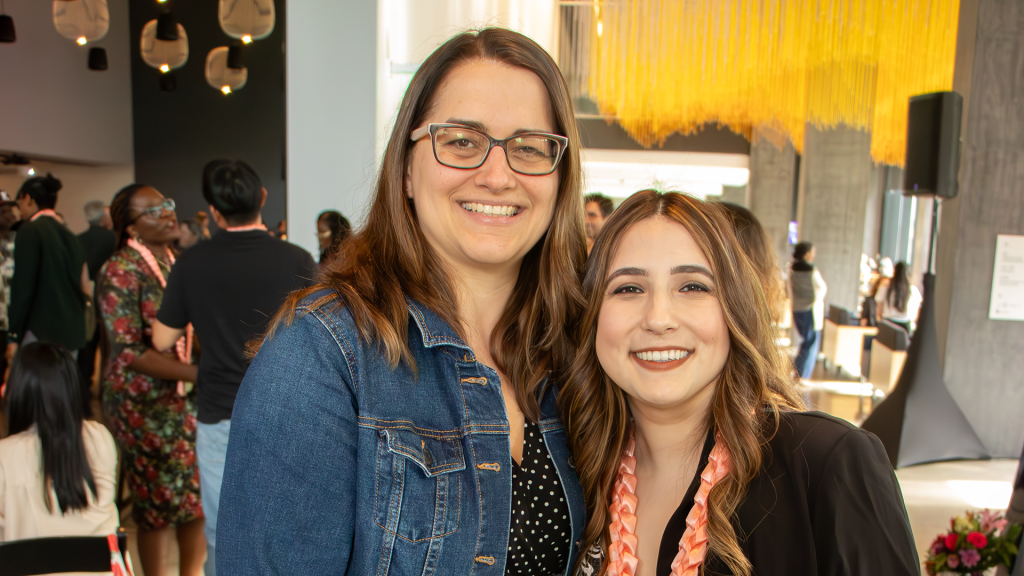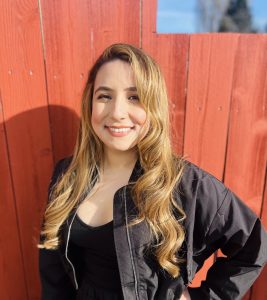Mayra Muratalla Muñoz of the Online Master of Public Health program advocates for sexual assault survivors, inside and outside of the classroom. Her practicum focuses on improving the forensic exam for disabled survivors.

Online MPH student Mayra Muratalla Muñoz is a program ambassador, an advocate for sexual assault survivors, and the recent recipient of the Oustanding Master’s Student award. Since starting the Online MPH program, she has received eight scholarships and awards, including the Latinx Scholars Graduate School Fellowship.
“Bilingual and bicultural, Ms. Muratalla Muñoz is deeply dedicated in her service to, and leadership within, our community. She is passionate about identifying barriers that make it difficult for survivors of domestic violence and sexual assault to seek justice and health care. Mayra has worked to remove those barriers and create policies that are equitable and serve survivors. Most recently, her dedication and long experience with survivors of domestic violence and sexual assault have moved into action-oriented research,” said Dr. Jeff Harris, professor of Health Systems and Population Health.
Muratalla Muñoz was drawn to public health based on her experience navigating bureaucratic and user-unfriendly systems like Medicaid and EBT as a disabled, low-income person. Having informally translated for her family members for many years, she seeks to make systems more equitable for people of all backgrounds.
“I saw how much these systems were creating retraumatization or barriers, and thought ‘this needs to be fixed,’” said Muratalla Muñoz. She debated between social work and public health, but settled on public health for its ability to make system-wide change. Additionally, she specifically chose the Online MPH program for its flexibility: classes meet once a week, allowing her to balance class with medical treatments.
She reflected, “I’m not overburdening myself, causing more stress, I’m actually doing something I enjoy while still taking care of myself. So I felt more fulfilled.”
Advocating for Sexual Assault Survivors

Muratalla Muñoz’s advocacy work for sexual assault survivors at SafePlace, an Olympia-based organization, comes from a deeply personal place. After she was assaulted, she received care from a hospital with a SafePlace advocate present.
“This was the first time I had an advocate there telling me I didn’t need to do what I didn’t want to do, somebody who knew that I was disabled,” said Muratalla Muñoz. “She just did really well accommodating me or telling the nurses and doctors to provide accommodations…Having somebody do that and be really compassionate, it just made it bearable…I just knew I wanted to do that.”
In 2020, she began volunteering at SafePlace. She has since logged over 2,500 hours of volunteering, and received two awards from the organization. When the COVID-19 pandemic hit, SafePlace found itself even more in need of volunteers willing to show up in-person.
“I started going in all the time,” Muratalla Muñoz recalled. “Wherever they needed somebody, I filled in.”
Dr. Harris commended her advocacy work, stating, “Her exceptional academic achievements, demonstrated leadership abilities, and dedication to public health service and advocacy make her a truly deserving recipient of these honors.”
Improving the Forensic Exam for Disabled Survivors
All Online MPH students complete a practicum: a hands-on project in partnership with a community organization. For her practicum, Muratalla Muñoz is tackling how to improve the forensic exam for disabled survivors. The project stems from her firsthand understanding that survivors can have vastly different experiences at different hospitals.
Muratalla Muñoz began her practicum project by conducting a literature review to assess common barriers for survivors and understand what programs exist to address those barriers. Next, she’s interviewing disability advocates at organizations that serve survivors. Her final step is to survey hospitals to learn about their accommodation options and barriers to implementation.
For Muratalla Muñoz, her academic and advocacy work both stem from her desire to make large-scale systems more equitable, for everyone.
“Something I always butt heads with in real life is organization and systems. I just want to make it better,” she reflected.